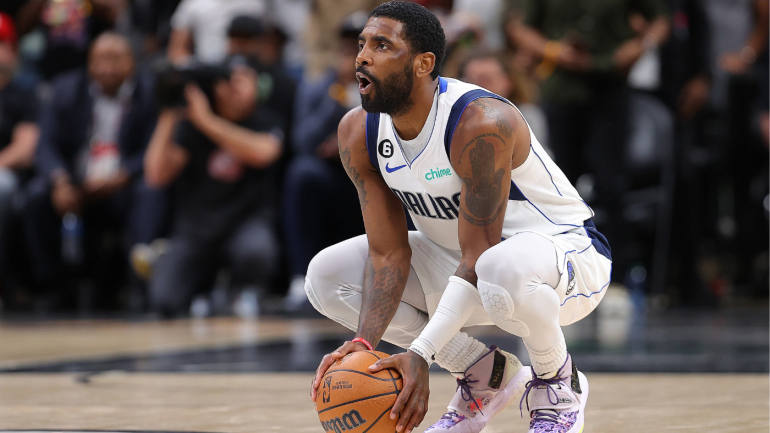The Mavs’ chances of making the playoffs were 58% at the trade deadline. Now, it is 6%.
Dallas Mavericks supporters, welcome to the Kyrie Irving Experience.
His entrance is not, and never was, about his ability to score seductively. Or the unstoppable talent he epitomizes in a league that is built on basketball brilliance. Not all the grandeur and greatness one may think when pairing Luka Doncic’s tremendous talent and scoring prowess.
Irving, his teams, and those organizations that discovered too late that what appears appealing and desirable from a distance turns out to be up close to be a slow-moving organizational disaster movie have been defined for nearly six years by losing.
The absurd thing right now isn’t that Irving manipulates teams in this manner. The absurd thing is that Irving isn’t perceived for what he truly is by teams, fans, NBA media, and perhaps at least one general manager who is watching Irving’s potential free agency this summer. Like to love, talent blinds. When it becomes poisonous, it also damages objects.
The Mavs’ miserable 24 games since acquiring Irving at the trade deadline serve as a case in point.
Dallas is 8-16 at that time. To put it in perspective, only four teams have had worse records throughout that time period: the Trail Blazers, who recently stopped Damian Lillard from scoring, the Pistons, Rockets, and Spurs, the three poorest teams in the league.
When Doncic and Irving team up, Dallas has a startling record of 4-11. That’s terrible, as Dallas has dropped from sixth position in the West when Irving was playing for Brooklyn to eleventh place as a result of all this losing since dealing for the erratic star. SportsLine’s odds for the Mavs to make the playoffs have fallen from 58% to 6% as a result of his arrival and what we’ve seen thus far.
Doncic, who is averaging 32.8 points per game, would be the fifth-highest single-season scorer to miss the postseason in NBA history if Dallas were to miss the playoffs.
The Kyrie Irving Effect is evident in this. And it has been this way for a while.
Throughout the last five seasons, Kyrie’s teams had winning percentages that were either equal to or higher than when he wasn’t on the court. Before the deal this season, Brooklyn won 67% of the games Kyrie sat out while winning 60% of the games he played. I previously blogged about this in November. He wins at a little higher rate in Dallas (37% when he plays against 33% when he doesn’t), but a.368 winning percentage is still not enough to get him back to the Western Conference finals in late May. Midway through April, tee times fill up quickly.
And that only covers the numerical aspect of the story.
A stroll down Kyrie’s memory lane includes: Leaving the Cavaliers not long after winning the NBA title. Since he left Boston, the Celtics have had roaring success. Shortly after directly witnessing the Kyrie Irving Effect and Ben Simmons’s subsequent arrival for that club, James Harden forced his way out of Brooklyn. The abhorrent antisemitism. the collapse of Brooklyn’s team and the transition of Durant to the Suns. so forth.
The math can quantify the Kyrie Irving Effect. Nevertheless, it can also be seen from a height of 10,000 feet, from which a vivid picture of devastation and dysfunction has emerged.
Kyrie Irving is a disaster for teams and the living embodiment of how very challenging it is to develop an NBA champion. Since he ought to triumph. He simply does not.
We do a terrific job of rewarding players who step up when necessary or who make excellent leaders; players who possess those concrete qualities that enable teams to become better versions of themselves. But, we act as if the opposite is not true, as if talented people cannot also be problematic teammates with an unfavorable overall outcome.
Kyrie Irving possesses talent. He had me spellbound. At the top level of the game, he has a rare ability to get buckets. He successfully defeated Steph Curry in a three-point shootout at the NBA Finals’ peak in 2016 to become a champion. He is a statistical wonder who, this year at least, is flirting with the exceptional 50/40/90 season, which would be his second.
He nonetheless loses.
He worsens his group.
And that presents a problem. I’ve met with front office executives who have made persuasive arguments that Irving is not beneficial for a team, only to add, after the stories and anecdotes and grimaces, that they’d take him in a heartbeat if given the chance. The NBA is under tremendous pressure to win.
Perhaps this season has finally demonstrated that Irving’s talents do not account for everything.
Yet, the Mavericks fiasco is more likely to inspire another team to commit the same error in a league where exceptional talent has its own siren song and the need to find a way to win can cloud the judgment of front-office decision-makers who should by this point know better.
Gainers gain. And Irving has repeatedly demonstrated that he is not one of those. no longer.
